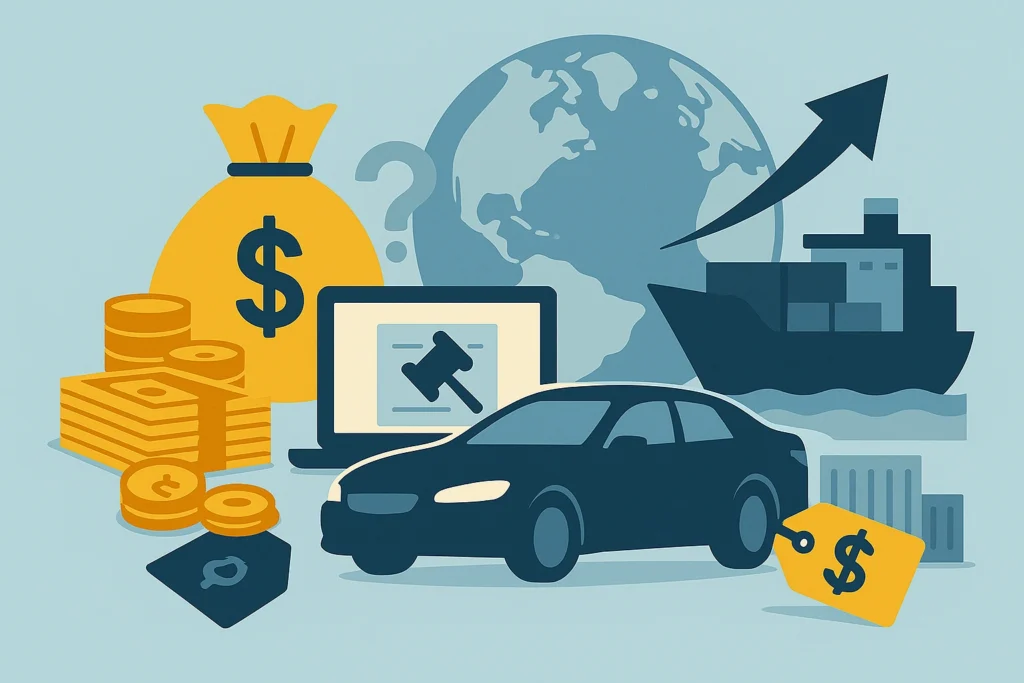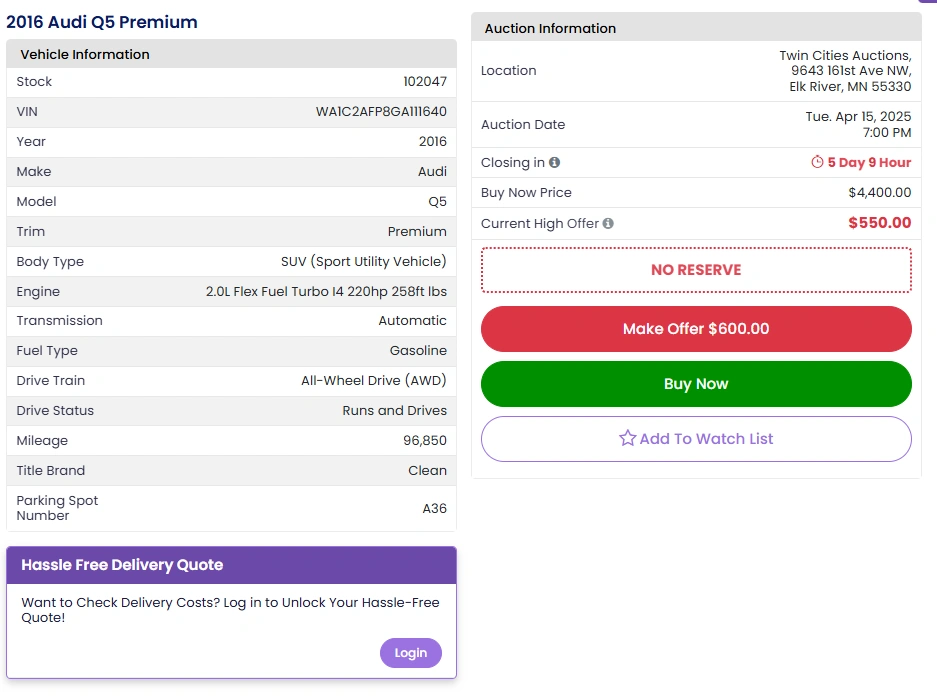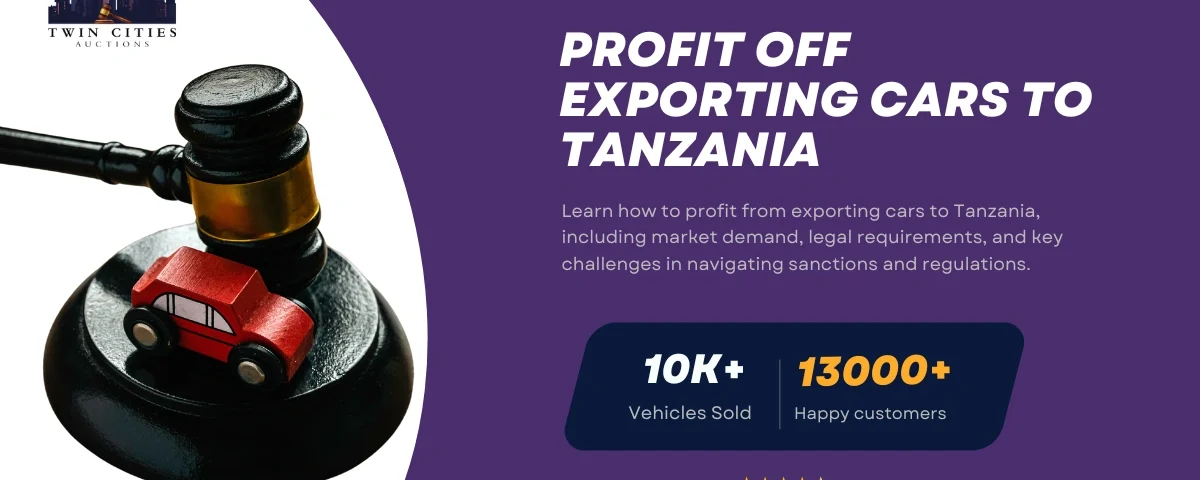Did you know Tanzania imported an estimated 20 000 to 25 000 motor vehicles in 2023, valued at 120 million to 140 million USD and growing at 9 percent annually?
US exporters tapping this demand have boosted profit margins by up to 17 percent within six months. This guide shows you how to comply with Tanzanian regulations, calculate costs, and manage logistics for maximum returns.

Key Takeaways
- Tanzania imported about 20 000–25 000 vehicles in 2023
- Import costs add about 43 percent of vehicle value
- Profit equals landed cost plus your margin
- Main ports: Dar es Salaam and Tanga
- Required documents: invoice, bill of lading, import declaration, certificate of conformity
- Best sourcing option: U S auto auctions
Understanding the Tanzanian Market
In the first quarter of 2023, Tanzania experienced a 1.2% increase in the import price index for vehicles compared to the same period in 2022.
This uptick reflects a growing demand for imported vehicles, influenced by economic growth and urbanization. Notably, the import price index for “vehicles other than railway/transport ways roll-stock” rose to 110.8 in Q1 2023 from 109.5 in Q1 2022.
| Metric | Figure |
| Vehicles Imported | 20 000–25 000 units |
| Estimated Market Value | 120–140 million USD |
| Year‑over‑Year Growth | 9 percent |
Source: National Bureau of Statistics Tanzania
Regulations and Compliance
Tanzania enforces an eight-year maximum age limit on imported vehicles to ensure road safety and environmental standards.
Additionally, all vehicles must possess a Certificate of Conformity (CoC) from an authorized inspection agency before shipment.
This certificate verifies that the vehicle meets the required safety and environmental regulations. The East African Community Customs Management Regulations outline these requirements in detail.
Source: Tanzania Revenue Authority
| Document | Purpose | Required For |
| Commercial Invoice | Declares sale value | All imports |
| Bill of Lading | Proof of maritime shipment | Sea‑borne imports |
| Import Declaration | Official filing with TRA | All vehicle imports |
| Certificate of Conformity | Verifies safety and emissions compliance | All imports |
Building Your Landed Cost and Profit Model
Accurate cost modeling is essential. Use the following duty and tax structure:
| Cost Item | Rate | Calculation Example (USD) |
| CIF Cost | — | 10 000 |
| Import Duty | 25 percent | 2 500 |
| Value Added Tax | 18 percent | (10 000 + 2 500) × 0.18 = 2 250 |
| Miscellaneous Fees | 5 percent | 10 000 × 0.05 = 500 |
| Total Landed | — | 15 250 |
Source: Tanzania Revenue Authority
Add your target profit margin (e.g., 20 percent) on top of the landed cost.
Logistics and Shipping Routes
Tanzania’s primary port for vehicle imports is Dar es Salaam, offering weekly container services from major global ports. Transit times vary based on the origin:
| Route | Transit Time | Notes |
| U S East Coast → Dar es Salaam | 20 to 24 days | Weekly container services |
| U S Gulf Coast → Tanga | 22 to 26 days | Breakbulk available |
| U S West Coast → Dar es Salaam | 28 to 32 days | Panama Canal transit included |
Source: Bolloré Logistics & Maersk
Financing and Payment Security
Importers and exporters often utilize financial instruments to mitigate risks associated with international trade. Letters of Credit (LCs) are commonly used to ensure payment security, especially for first-time transactions. Open Account terms may be extended to trusted partners with established relationships.
Additionally, forward contracts are employed to hedge against currency fluctuations between the Tanzanian Shilling (TZS) and major currencies like the U.S. Dollar (USD), providing financial predictability.
| Method | Risk Level | Best Use |
| Letter of Credit | Low | First orders; large shipments |
| Open Account | High | Established, trusted buyers |
| Escrow | Medium | Ensures delivery before payment release |
Source: U S Export‑Import Bank
Mitigate USD/TZS fluctuations with forward contracts via leading Tanzanian banks.
Common Pitfalls to Avoid
- Underestimating combined duty and tax rates erodes margins
- Missing import declaration delays clearance
- Overlooking age‑limit enforcement leads to rejections
Use the TRA pre‑shipment checklist to confirm all documentation.
Source: Tanzania Revenue Authority
Why Auctions Are a Smart Choice for Car Purchases
Auctions can be an excellent source for late-model vehicles with clear chains of title and affordable pricing. Twin Cities Auctions, based in Minnesota, is one such reputable auction house that offers a wide range of vehicles at competitive prices.
Key Benefits of Buying from Auctions:
- Wide Selection: Auctions like Twin Cities Auctions offer a variety of vehicles, from low-budget cars to high-end models.

- Competitive Pricing: Auctions often offer vehicles at prices below retail value, enabling dealers to maximize their profit margins.

- Transparency: Auctions provide full vehicle history reports, so you know exactly what you’re buying.

- Convenient Bidding: Many auctions offer online bidding for your convenience, making it easier to source vehicles without being physically present.
Twin Cities Auctions: A Smart Vehicle Sourcing Choice
For those in the automotive industry, Twin Cities Auctions offers an excellent platform for sourcing quality vehicles at competitive prices.
Whether you are just starting or expanding your business, this auction house provides transparency, competitive pricing, and a broad selection.
| Feature | Description |
| Inventory Variety | Wide range of cars, trucks, and SUVs available |
| Competitive Pricing | Below-market pricing allows for higher profit margins |
| Vehicle History Reports | Detailed history reports for every vehicle |
| Online Bidding | Convenient online bidding options for dealers |
| Financing Options | Financing available to help with inventory purchases |
Conclusion
With Tanzania’s market growing at 9 percent annually and profit margins of up to 17 percent within reach, you have a clear path to lucrative exports.
By mastering the eight-year age limit, securing a certificate of conformity and import declaration, and accurately modeling your landed cost—including duty, VAT, and fees—you’ll protect your margins and avoid costly delays.
Choosing reliable sea routes through Dar es Salaam or Tanga, pairing the right financing (letters of credit or escrow) with USD/TZS hedging, and sourcing quality late-model vehicles from U S auto auctions like Twin Cities Auctions will streamline your operations.
Follow this guide closely, double-check every document against the TRA checklist, and you’ll be well positioned to turn Tanzania’s rising demand into sustained, profitable growth.
Twin Cities Auctions: No Dealer License? No Problem!
Are you interested in buying or selling a car but worried about the complexities of needing a dealer license? Worry no more! At Twin Cities Auctions, we’ve removed the barriers, making our auctions open to everyone.
Whether you’re a seasoned buyer or a first-time seller, our platform offers a welcoming environment where you can participate freely. Experience the ease and excitement of our next auction and discover just how simple and rewarding a car auction can be!
Looking for more options? Explore our comprehensive list of all available car auctions across the United States. Your next deal might be just a click away!
FAQ
What are Tanzania’s auto import duties?
Import duty is 25 percent of CIF value plus VAT of 18 percent.
Can I export used cars to Tanzania?
Yes—vehicles must be no older than eight years and hold a certificate of conformity.
What age restrictions apply?
Imports must be manufactured within the last eight years.
How long does customs clearance take?
Typically 10 to 14 business days once all documents are complete.
Are emissions tests mandatory?
Yes—certificate of conformity must verify compliance with national standards.


